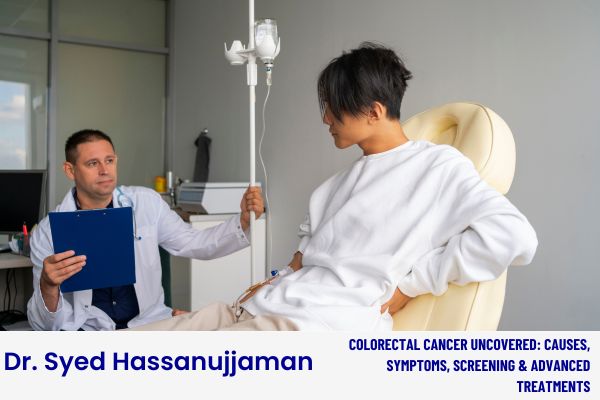Colorectal Cancer Uncovered: Causes, Symptoms, Screening, and the Latest Treatment Advances with Dr. Syed Hassanujjaman
Colorectal cancer is one of the most common and potentially life-threatening cancers worldwide. However, early detection and advancements in treatment have significantly improved survival rates. Dr. Syed Hassanujjaman, a leading cancer specialist, sheds light on the causes, symptoms, screening methods, and the latest treatment innovations for colorectal cancer.
What is Colorectal Cancer?
Colorectal cancer develops in the colon or rectum when abnormal cell growth leads to the formation of malignant tumors. It often starts as noncancerous polyps that may become cancerous over time if left untreated.
Causes and Risk Factors
Several factors increase the risk of developing colorectal cancer, including:
- Age – Most cases occur in individuals over 50.
- Family History – A genetic predisposition increases the risk.
- Dietary Habits – A diet high in red and processed meats and low in fiber.
- Lifestyle Factors – Lack of physical activity, obesity, smoking, and alcohol consumption.
- Chronic Conditions – Inflammatory bowel diseases (IBD) like Crohn’s disease or ulcerative colitis.
Recognizing the Symptoms
Colorectal cancer symptoms often develop gradually, making early detection crucial. Warning signs include:
- Persistent changes in bowel habits (diarrhea, constipation, or narrowing of stools)
- Blood in stool or rectal bleeding
- Abdominal pain, bloating, or discomfort
- Unexplained weight loss
- Fatigue and weakness
Importance of Early Screening
Regular screening is key to detecting colorectal cancer at an early stage, often before symptoms appear. Recommended screening tests include:
- Colonoscopy – The most effective method for detecting and removing precancerous polyps.
- Fecal Occult Blood Test (FOBT) or Fecal Immunochemical Test (FIT) – Detects hidden blood in the stool.
- CT Colonography (Virtual Colonoscopy) – A non-invasive imaging test.
Advanced Treatment Approaches
Dr. Syed Hassanujjaman highlights modern treatment options that improve patient outcomes:
1. Surgery
- Laparoscopic and Robotic Surgery – Minimally invasive techniques that reduce recovery time and complications.
- Colectomy – Removal of the affected part of the colon, followed by reattachment.
2. Chemotherapy & Targeted Therapy
- Used before or after surgery to shrink tumors and destroy remaining cancer cells.
- Targeted drugs focus on specific cancer cell proteins to block their growth.
3. Immunotherapy
- Boosts the immune system to help it recognize and attack cancer cells more effectively.
4. Radiation Therapy
- Often used for rectal cancer to shrink tumors before surgery and reduce recurrence.
Prevention and Lifestyle Modifications
Dr. Syed Hassanujjaman advises the following preventive measures:
✔ Maintain a high-fiber diet with fruits, vegetables, and whole grains.
✔ Exercise regularly and maintain a healthy weight.
✔ Reduce consumption of red and processed meats.
✔ Avoid smoking and limit alcohol intake.
✔ Get screened regularly, especially if you have risk factors.
Conclusion
Colorectal cancer is highly treatable when diagnosed early. With advancements in screening and treatment, survival rates have improved significantly. If you experience any symptoms or have a family history of colorectal cancer, consult Dr. Syed Hassanujjaman for expert guidance and personalized care.
